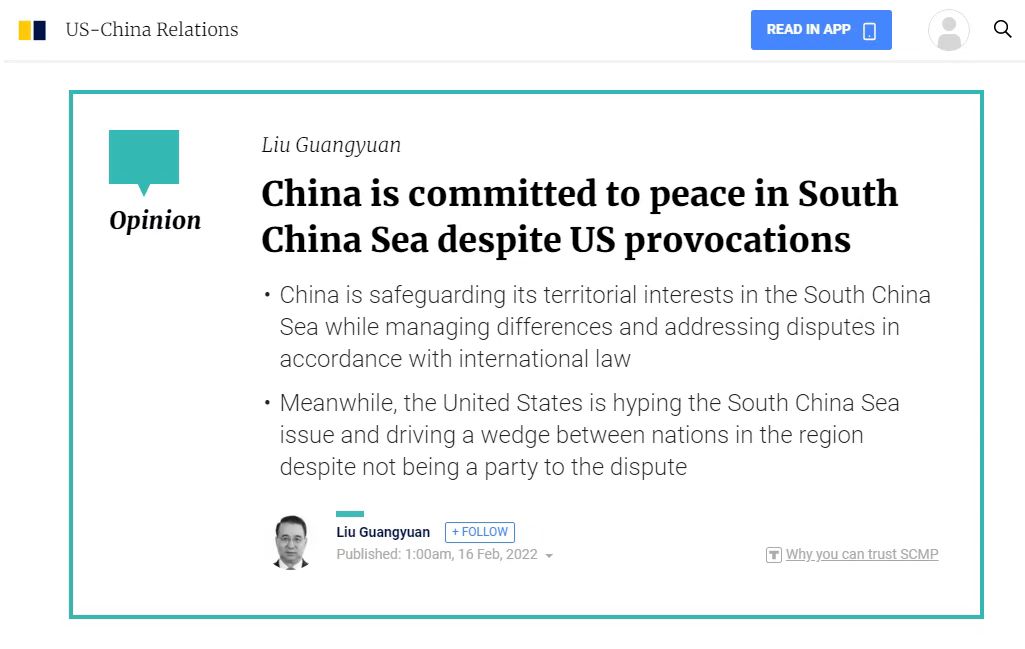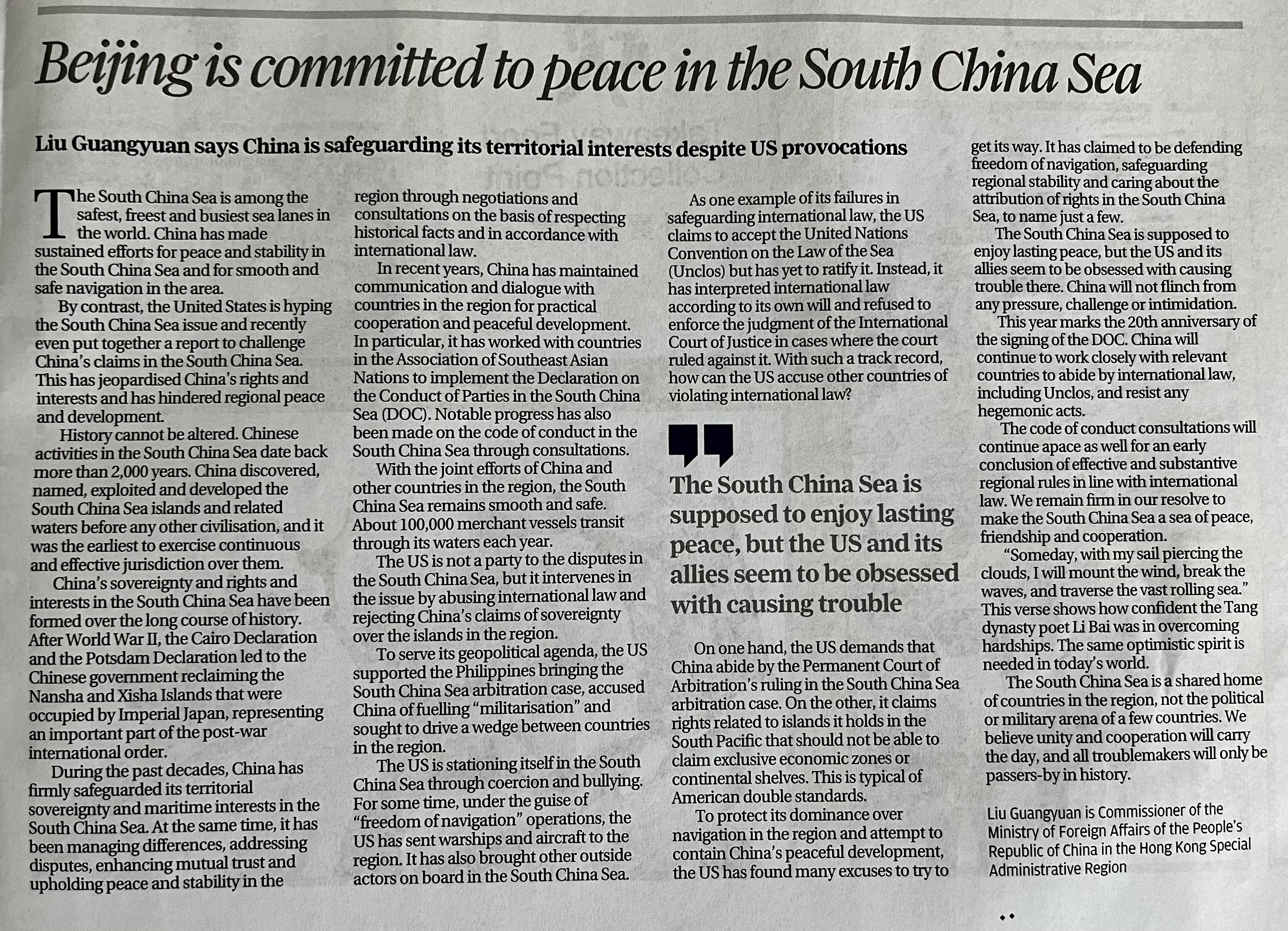Commissioner Liu Guangyuan contributed a piece to the South China Morning Post on 22 February 2022 titled "China is committed to peace in South China Sea despite US provocations". The full text is as follows:


China is committed to peace in South China Sea despite US provocations
The South China Sea is among the safest, freest and busiest sea lanes in the world. China has made sustained efforts for peace and stability in the South China Sea and for smooth and safe navigation in the area.
By contrast, the United States is hyping the South China Sea issue and even put together a report titled “Limits in the Seas” to challenge China’s claims in the South China Sea. This has jeopardised China’s rights and interests and has hindered regional peace and development.
History cannot be altered and justice will prevail. Chinese activities in the South China Sea date back more than 2,000 years. China discovered, named, exploited and developed the South China Sea islands and related waters before any other civilisation, and it was the earliest to exercise continuous and effective jurisdiction over them.
China’s sovereignty and rights and interests in the South China Sea have been formed over the long course of history. After World War II, the Cairo Declaration and the Potsdam Declaration led to the Chinese government reclaiming the Nansha and Xisha Islands that were occupied by Imperial Japan, representing an important part of the post-war international order.
During the past decades, China has firmly safeguarded its territorial sovereignty and maritime interests in the South China Sea. At the same time, it has been managing differences, addressing disputes, enhancing mutual trust and upholding peace and stability in the region through negotiations and consultations on the basis of respecting historical facts and in accordance with international law.
In recent years, China has maintained communication and dialogue with countries in the region for practical cooperation and peaceful development. In particular, it has worked with countries in the Association of Southeast Asian Nations to implement the Declaration on the Conduct of Parties in the South China Sea (DOC). Notable progress has also been made on the Code of Conduct in the South China Sea through active consultations.
With the joint efforts of China and other countries in the region, the South China Sea remains smooth and safe. About 100,000 merchant vessels transit through its waters each year.
The United States is not a party to the disputes in the South China Sea, but it intervenes in the issue by abusing international law and rejecting China’s claims of sovereignty over the islands in the region. To serve its geopolitical agenda, the US supported the Philippines bringing the South China Sea arbitration case, accused China of fuelling “militarisation” and sought to drive a wedge between countries in the region.
The US is stationing itself in the South China Sea through coercion and bullying. For some time, under the guise of “freedom of navigation” operations, the US has sent warships and aircraft to the region. It also brought other outside actors on board in the South China Sea.
As one example of its failures in safeguarding international law, the US claims to accept the United Nations Convention on the Law of the Sea (UNCLOS) but has yet to ratify it. Instead, it has interpreted international law according to its own will and refused to enforce the judgment of the International Court of Justice in cases where the court ruled against it. With such a track record, how can the US accuse other countries of violating international law?
On one hand, the US demands that China abide by the Permanent Court of Arbitration’s ruling in the South China Sea arbitration case. On the other, it claims rights related to islands it holds in the South Pacific that should not be able to claim exclusive economic zones or continental shelves. This is typical of American double standards.
To protect its dominance over navigation in the region, provoke confrontation and attempt to contain China’s peaceful development, the US has found many excuses to try to get its way. To do so, it has claimed to be defending freedom of navigation, safeguarding regional stability and caring about the attribution of rights in the South China Sea, to name just a few.
The South China Sea is supposed to enjoy lasting peace, but the US and its allies seem to be obsessed with causing trouble there. China will not flinch from any pressure, challenge or intimidation.
This year marks the 20th anniversary of the signing of the DOC. China will continue to work closely with relevant countries to abide by international law, including UNCLOS, and push back against any hegemonic acts meant to disturb the South China Sea. The code of conduct consultations will continue apace as well for an early conclusion of effective and substantive regional rules in line with international law. We remain firm in our resolve to make the South China Sea a sea of peace, friendship and cooperation.
“Someday, with my sail piercing the clouds, I will mount the wind, break the waves, and traverse the vast rolling sea.” This verse shows how confident the Tang dynasty poet Li Bai was in overcoming hardships. The same optimistic spirit is needed in today’s world.
The South China Sea is a shared home of countries in the region, not a political or military arena of a few countries. We all believe unity and cooperation will carry the day, and all troublemakers will only be passers-by in history.